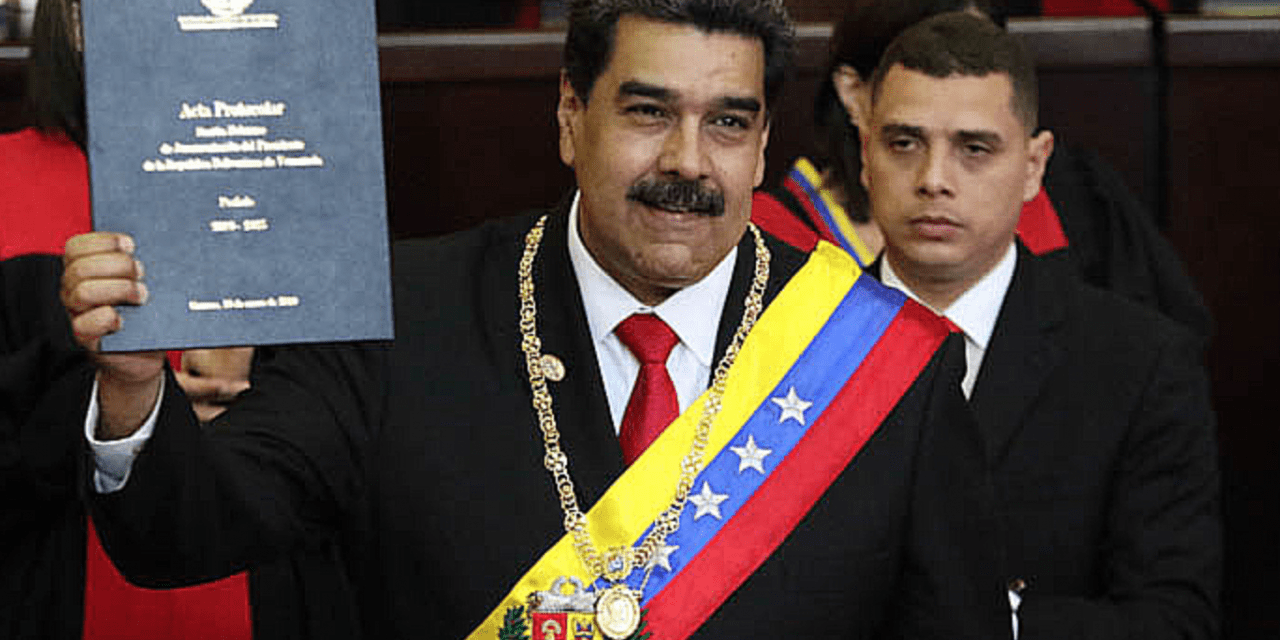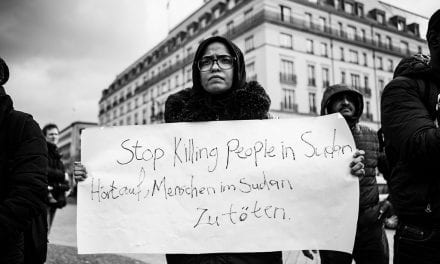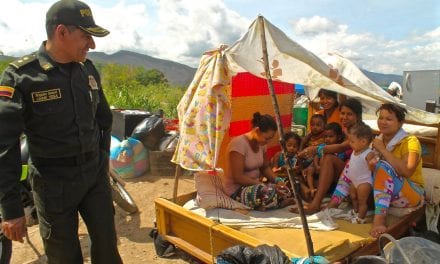By Jacob Gilbert*,
As recently as the late 20th century, Venezuela was one of the richest countries in Latin America. This was due in large part to the country’s massive oil reserves, some of the largest in the entire world.(1) Despite this wealth, Venezuela suffered from a series of social problems, chief among them being ever-increasing economic inequality. As the gap between the rich and the poor grew, the citizens of Venezuela decided to make a dramatic change to the nature of their government. In 1999, Hugo Chavez ascended to the Venezuelan Presidency based on a populist and socialist platform. Chavez laid the groundwork for his hand-picked successor, Nicholas Maduro, to take over the nation of Venezuela. Soon after Maduro came to power, the Venezuelan economy took a dramatic downturn. The economic crisis has given way to a humanitarian one as food and medical shortages have led to a steep decline in the well being of Venezuelan citizens. This in turn has jump-started a political crisis as Maduro’s rule is increasingly seen as illegitimate. (2) While many solutions have been proposed to alleviate the political crisis in Venezuela, it is evident this crisis will stay in a stalemate for the foreseeable future. This is the case for three reasons, which I will explore below. Firstly, the opposition to Maduro is unable to consolidate support. Secondly, the resilience of Maduro’s regime and his political allies in the Venezuelan military allows him to stay in power, despite popular opposition. Third, and most importantly, the lifelines Maduro receive in the form of foreign support, allows his regime to defy international opposition.
In Venezuela, the main opposition to Maduro is the Venezuelan National Assembly. On January 23rd 2019, head of the National Assembly Juan Guaido, declared himself the acting President of Venezuela. Several month later, the United States and 50 other nations had officially recognized Guaido as the legitimate President of Venezuela.(3) While Guaido enjoys recognition and support from many members of the international community it is meaningless without support from the Venezuelan military. The Venezuelan military is under the financial influence of Maduro and so, for the most part, it remains very loyal to him. Maduro put many parts of Venezuela’s economy under the control of military forces, including the distribution of food, raw materials, and even the national oil company, Petroleos de Venezuela Sa. (4) In this respect, higher-ranking members of the military (a group Guaido needs to sway), are just as much part of the problem as Maduro. The loyalty of the Venezuelan military to Maduro originates with changes that former President Chavez made to the military. Chavez politicized the military, bribed its members, intimidated rank and file members, and fragmented the command structure.(5) Guaido has been able to win over some lower-level members of the military, but other higher-ranking members have not been swayed. This is in large part because many military members fear being prosecuted for crimes if the Maduro regime falls. Guaido and the international community have not been able to make significant guarantees to these military members for immunity. Guaido has also been unable to consolidate enough political support within the citizenry of Venezuela. The most recent set of protests that Guaido has called for have had limited effect and are significantly smaller than the protests that were taking place earlier in the year.(6)
Maduro is propped up by his allies in Russia, China, Iran, and Cuba. At the United Nations General Assembly Chilean President Sebastian Pinera called attention to this, saying, “We have to realize … that allies are helping Maduro in Venezuela and we are talking about countries like Cuba, China, Russia, Iran, and Turkey.”(7) The two largest supporters of Maduro are China and Russia. China supports Maduro through financial assistance. Russia supports Maduro through both financial and military aid. This foreign support is significant for two reasons. Firstly, it gives a financial lifeline to the Maduro. Secondly, it deters foreign intervention by countries like the United States.
China has lent massive amounts of money to Maduro. Venezuela’s current debt to China numbers nearly 67 billion dollars. While Venezuela does not have the funds to pay back China, they are rich in oil, a commodity that China needs. Venezuela has been able to repay some of its debts by shipping oil to China. Although Venezuela has fallen behind on oil shipments, China has made a gamble to stick with the Maduro regime that at this point, they can not turn their back on.(8) Russian financial support comes in the form of Russian oil company Rosneft and the development of cryptocurrency. Maduro has given Rosneft full control over certain Venezuelan oil fields, allowing them to export the oil from these fields. This was done to relieve debts Venezuela had with Russia.(9) Russia also assisted Maduro in the development of the Venezuelan cryptocurrency known as the petro. This currency is backed by Venezuelan oil reserves.(10) The sale of the petro has provided another financial lifeline for Maduro, even as the United States banned its usage.
Since the early 2000s, Russia has remained closer to Venezuela than any other country in Latin America. Russia has made over 11 billion dollars selling military equipment to Venezuela since the early 2000s and makes over 70 million dollars annually in the selling of nonmilitary goods to Venezuela. (11)More significant than their trade relationship, however, is Russia’s military presence in Venezuela. Two Russian military factories, focused on weapons and ammunition, are currently under construction in Venezuela. Russia supplies parts and maintenance to military equipment previously purchased by Venezuela. This aspect of Russian assistance has intensified in recent years as the Russian military has also begun to offer guidance and strategy to the Venezuelan armed forces. (12)While some analysts don’t consider Russia and Venezuela to have a strong military alliance, the consultation role they play can have a significant impact on affairs in Venezuela. This was most clearly seen in the attempted uprising of Spring 2019. According to United States Secretary of State Mike Pompeo, this uprising had prompted President Maduro to consider fleeing the country for Cuba. However, Russia advised Maduro to stand his ground and not leave. Also, Russia had sent two military planes with 100 soldiers to Venezuela in late March. They sent even more military technicians in June after the uprising failed.(13)
When the United States attempted to send humanitarian aid to Venezuela through the Columbian border, Maduro blocked it. He then engaged in talks with Russian Foreign Minister Sergei Lavrov, and, soon after, Russia, China, and Turkey supplied Maduro with humanitarian aid. The nations who prop up Maduro have publicly stated their wish for peaceful negotiations between Maduro and his opposition. However, tactics to sabotage negations seem to contradict these wishes. The sabotage is most often attributed to the work of Cuban counterintelligence. In return, Venezuela has been supplying Cuba with oil during its energy crisis. (14)
It is reasonable to ask why Russia and China would continue to support a Maduro regime, which is entrenched in ever-worsening financial straits. At a certain point, it would be reasonable to assume that these countries would see the Maduro regime as destined for failure. Russia and China, however, both find value in supporting Maduro, for different reasons. For Russia, it is the ideological underpinnings that guide their foreign policy. For China, their reasons are more nuanced. Russian support of the Maduro regime stems from the Gerasimov Doctrine. The Doctrine, which was adopted in 2013, states that Russia is in a state of perpetual warfare. (15) This means that in modern times the lines between peacetime and wartime are constantly blurred. So for Russia, the political and social conflicts in Venezuela are a new type of battlefield, and Russian interests are best served in protecting the Maduro regime. China’s support for Maduro stems from a broader and more pragmatic mission to increase their influence in Latin America overall.(16) China also has a financial stake in the Maduro regime. With the Maduro regime still owing billions of dollars to China, the Chinese are counting on Venezuelan oil imports. The opposition led by Guaido has said they will not continue giving oil to China. So for China to not lose out on billions of dollars, they have a financial stake in seeing the continuation of the Maduro regime.
The continued support of Maduro by countries like Russia and China creates serious roadblocks for the United States and others who have come out in support of the opposition. Many have suggested invoking the R2P doctrine as a reason for a more serious intervention. It is hard for the United States to make a decisive move in Venezuela, for it would risk escalating tension with either Russia and China. More serious sanctions on Venezuela can not be imposed by the United Nations, because both Russia and China can exercise their veto power on the Security Council. United States sanctions up to this point seem to have had little effect on Maduro and have only served to worsen the situation on the ground for Venezuelan citizens.(17) For a regime change to take place in Venezuela, the best hope is for inroads to be made in persuading the military to stop supporting Maduro. For this be accomplished, significant incentives must be given to members of the military or they will likely not break rank. Encouraging Russia and China to end their support for Maduro would also help end his regime, but this scenario is unrealistic in the current climate. Given these facts, it is likely that the Maduro regime will stay in power for the foreseeable future.
- Patrick Gillespie, Marilia Brocchetto, Paula Newton, “Venezuela: How a rich country collapsed” CNN Business, CNN, July 30, 2017, https://money.cnn.com/2017/07/26/news/economy/venezuela-economic-crisis/index.html.
- Ibid.
- Uri Friedman, “Venezuela’s Struggle for Legitimacy Comes to New York.” The Atlantic, Atlantic Media Company, September 29, 2019. https://www.theatlantic.com/politics/archive/2019/09/us-political-turmoil-clouds-support-venezuela/599038/.
- Ibid.
- Brian Ellsworth, Mayela Armas, “The Maduro mystery: Why the armed forces still stand by Venezuela’s beleaguered president”, Reuters Investigates, Reuters, July 28, 2019, https://www.reuters.com/investigates/special-report/venezuela-military/
- No Author listed, “Venezuela: Rival Rallies Held as Guaido Calls for Daily Protests.” Juan Guaido News | Al Jazeera. Al Jazeera, November 17, 2019. https://www.aljazeera.com/news/2019/11/venezuela-rival-rallies-held-guaido-calls-daily-protests-191117060107276.html.
- Joseph M. Humire, Christina Armes, “To Get Rid of Maduro in Venezuela, US Must Challenge His Enablers.” TheHill. The Hill, October 4, 2019. https://thehill.com/opinion/international/464012-to-get-rid-of-maduro-in-venezuela-us-must-challenge-his-enablers.
- Matt Ferchen, “Analysis | Why Did China Stand by Maduro in Venezuela?”, The Washington Post, WP Company, February 5, 2019. https://www.washingtonpost.com/news/monkey-cage/wp/2019/02/05/why-did-china-stand-by-maduro-in-venezuela/.
- Farah, Douglas, and Kathryn Babineau, “Extra-regional Actors in Latin America: The United States Is Not the Only Game in Town.” PRISM 8, no. 1 (2019): 96-113. www.jstor.org/stable/26597313.
- Ibid.
- Humire, Armes, “To Get Rid of Maduro in Venezuela, US Must Challenge His Enablers.”, The Hill
- Ibid.
- Ibid.
- Antonio Maria Delgado “Venezuela Can’t Sell Its Oil and Storage Tanks Are Full – so It’s Giving It Away to Cuba.” Miami Herald. Miami Herald, October 4, 2019. https://www.miamiherald.com/news/nation-world/world/americas/venezuela/article235808947.html.
- Farah, Douglas, Babineau, “Extra-regional Actors in Latin America: The United States Is Not the Only Game in Town.” Prism
- Ibid.
- Nichola Kristof, “Venezuela’s Kids Are Dying. Are We Responsible?” The New York Times, The New York Times, November 23, 2019, https://www.nytimes.com/2019/11/23/opinion/sunday/venezuela-us-sanctions.html
*Disclaimer: The content contained in the following material is the sole ownership of the author and does not reflect the Towson University Journal of International Affairs nor Towson University in any respect whatsoever.







